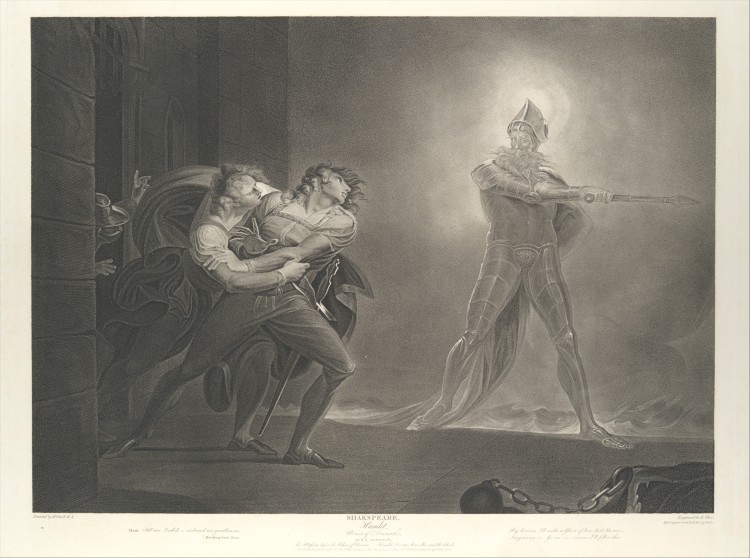
Hamlet, Horatio, Marcellus and the Ghost (Shakespeare, Hamlet, Act 1, Scene 4)
29th September 1796 – by Robert Thew, engraver, after Henry Fuseli (1741-1825)
image: Metropolitan Museum of Art – New York
The phrase something is rotten in the state of Denmark and its variants mean there is a corrupt element underlying a situation, and, in weakened sense, something is incorrect or unsatisfactory.
This phrase originates in the observation made by Marcellus in The Tragicall Historie of Hamlet Prince of Denmarke (Quarto 1, 1603); the ghost of Hamlet’s father has appeared:
– Marcellus. My Lord be rulde [= ruled], you shall not goe.
– Hamlet. My fate cries out, and makes each pety Artiue [= artery]
As hardy as the Nemeon Lyons [= Nemean lion] nerue,
Still am I cald [= called], vnhand me gentlemen;
By heauen ile make a ghost of him that lets me,
Away I say, go on, ile follow thee.
– Horatio. He waxeth desperate with imagination.
– Marcellus. Something is rotten in the state of Denmarke.
– Horatio. Haue after; to what issue will this sort?
– Marcellus. Lets follow, tis not fit thus to obey him. exit.
The earliest allusive use of the phrase that I have found is from The Manchester Mercury and Harrop’s General Advertiser (Manchester, Lancashire) of 18th February 1772. Caroline Matilda (1751-75), daughter of the Prince of Wales, was married to her cousin, King Christian VII of Denmark (1749-1808), who was mentally ill. She had an affair with the German doctor Johann Friedrich Struensee (1737-72), personal physician to the king. Struensee became de facto regent of the country, but a coup d’état involving the Queen Dowager, Juliana Maria (1729-96), brought down his government by exposing his affair with the Queen.
London, February 11.
Extract of a Letter from Amsterdam, Feb. 6.By the last Letters from Denmark, we hear that the Queen, who is confined at Cronenburgh, keeps her Health, but cannot sleep, and eats but little. Count Struensee is confined in a Dungeon, appropriated for the meanest Malefactors, loaded with Fetters, and exposed to the View of all the Passengers through an Iron Grate next the Street. Count Brandt and some others, are treated in the same Manner. The Queen Dowager carries every Thing with a very high Hand; and her own son Prince Frederick, who is 19 Years or Age, is made President of the Council. The Court for trying the State Prisoners is met; and, it is said, their Fate will be determined in less than two Months: What that will be, may be guessed at, from the Spirit of Revenge by which the Queen Dowager seems to be driven. Whatever these people may have been guilty of, the Cruelty they are treated with in Prison discovers the Cloven foot. They are allowed but half a Dollar a Day for their Sustenance, and they are so fettered that they cannot feed themselves. The Queen is allowed to have some of her Ladies and Servants about her. This News must greatly affect the Royal Family in England, but they can do nothing in it, the King of Denmark is absolute, and not accountable to them for his Actions.
The King of Denmark, we hear, has sent his Majesty private Advice, that he had no way to save the Queen’s Life but by consenting to her Imprisonment. The Danish Monarch has not obtained a safe Channel for corresponding explicitly with England; and this, we hear, is the reason why no Accounts are published in London by Authority.
A Rupture with the Danes many sensible now imagine to be almost unavoidable; and as the Electorate of Hanover lies quite contiguous to some Parts of Denmark, Orders have been sent, we are told, to the Hanoverian Commander in Chief, to march a powerful Force towards those Vicinages, to act upon the very first Emergency.
Nothing can set the Affair of Continental Marriages with the Royal Family of England in so strong a point of View, as the present unhappy Situation of Denmark; we married his Majesty’s Sister to a King, and are now probably on the Eve of a bloody War to revenge her Injuries: Whereas had she married into a private Family at home, we should not only have avoided a Rupture with our Neighbours, but possessed the amiable Princess, for whose Life we now tremble with the greatest Anxiety.
The Prussian Forces are said to be under marching Orders, and the frequency of Reviews among the Imperial Trooops [sic] indicate together, that “something is rotten in the State of Denmark,” and very near destroying the public Tranquility [sic] of Europe.
